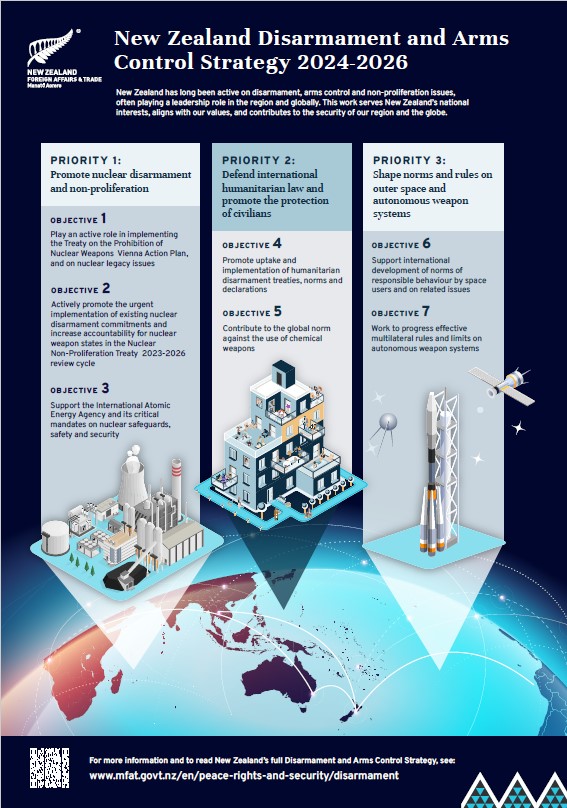On this page
New Zealand has long been active on disarmament and non-proliferation issues in our pursuit of a safer and more secure world, free from nuclear weapons and other weapons of mass destruction, where international law is respected and civilians in conflict zones are protected from harm, and where the international community is responsive to new and emerging threats and challenges.
Our approach: New Zealand Disarmament and Arms Control Strategy 2024–2026

In light of the challenging global security environment and the volume of urgent competing priorities, New Zealand’s approach to nuclear disarmament, non-proliferation and arms control is guided by a strategy for where we put our effort
This strategy [PDF, 1.1 MB] draws on our existing reputation, experience and relationships to continue pursuing long-standing objectives. It identifies our priority objectives for 2024–2026, the context in which we are pursuing them, and the means through which we aim to achieve them.
The strategy aligns with the goals set out in Ministry of Foreign Affairs and Trade’s Strategic Framework. It reflects our humanitarian approach to disarmament and our steadfast view that forward movement on disarmament is not conditional on an improved international situation but can contribute to its achievement.
As the strategy makes clear, New Zealand is most effective when we work closely with our bilateral friends and partners, international organisations, academics and civil society at home and offshore. Join the kōrero — follow us on X | @DisarmamentNZ(external link) and share your views on these important issues.
MFAT’s role
MFAT’s International Security and Disarmament Division implements New Zealand’s Disarmament and Arms Control Strategy. We advise Ministers on arms control, non-proliferation, and disarmament policy. The division advances New Zealand’s interests through our diplomatic posts, especially in Geneva, Vienna, The Hague, and New York, as well as at home. We ensure our obligations under international treaties and arms control regimes are met. MFAT also works closely with other relevant government departments and agencies.
MFAT acts as Secretariat for the Public Advisory Committee on Disarmament and Arms Control (PACDAC), which advises the government on disarmament issues.
More on disarmament, non-proliferation, and arms control
New Zealand’s disarmament work is guided by international treaties in two areas:
Weapons of mass destruction – Nuclear weapons, chemical weapons and biological weapons
Conventional weapons – Anti-personnel mines, cluster munitions, arms trade, small arms and light weapons, and inhumane weapons
We also engage in international discussions on autonomous weapon systems
We're also party to several international arrangements on the import and export of strategic goods (weapons and materials that can be used to manufacture weapons). In line with these agreements, New Zealand has laws around the trade of strategic goods.

